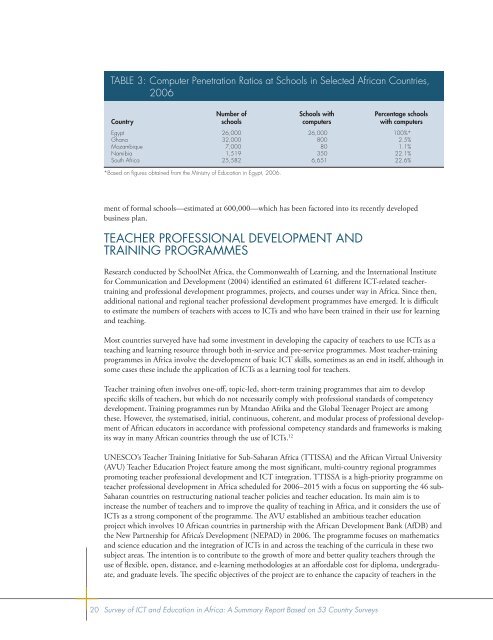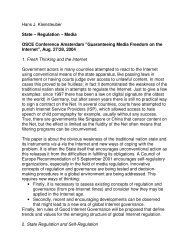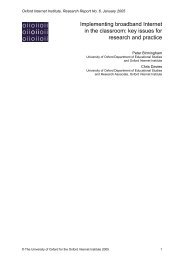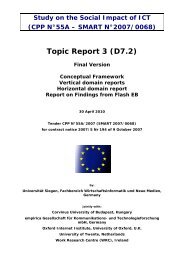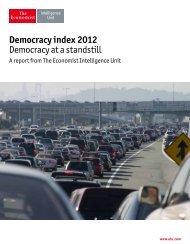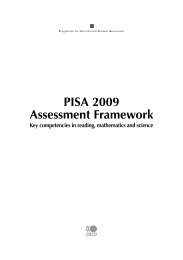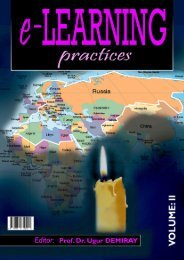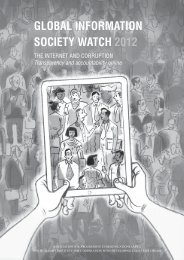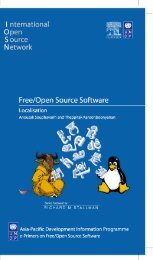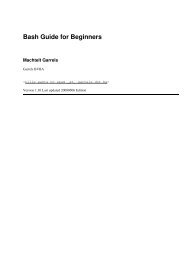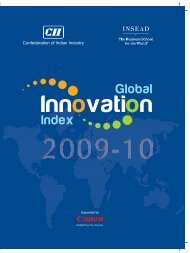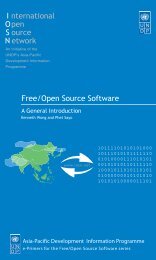nnnnnnsourced second-hand and refurbished PCs and have imposed minimum specifications when obtainingthe PCs. In these cases organisations like SchoolNet Namibia, SchoolNet Mozambique, World LinksZimbabwe, SchoolNet Nigeria (in partnership with organisations like the Education Tax Fund),Computers for Schools Kenya, and SchoolNet Uganda have established PC refurbishment centres ortechnical services centres that support the deployment of computers, maintenance, and support toschools.VSATSome countries have experimented with very small aperture terminal (VSAT) solutions that enableremote access through the use of satellite and help overcome limitations imposed by vast distances andrugged terrain. SchoolNet Uganda initiated a pilot with 11 schools in 2001 that brought some benefitsbut that also proved expensive and unsustainable. The private sector consortia in the NEPAD e-SchoolsDemo Project promoted VSAT solutions in some countries such as Mali and Senegal.ElectricityLack of access to electricity, especially in rural schools, is an added challenge that some countries haveconfronted. For example, SchoolNet Namibia piloted the use of solar panels in schools. In Nigeriaschools have invested in generators to accommodate regular power outages. The NEPAD e-SchoolsDemo Project also made use of generators in Uganda.Mobile phonesMore recently, mobile phones have been used for learning in South Africa with the piloting of the Mathon MXit and MobilEd programmes by the Meraka Institute. In Kenya the use of short message system(SMS) among teachers has also been tried.Multi-channel learningOrganisations like Mindset Network in South Africa have introduced a multiple platform approach inthe distribution of its locally produced electronic education content to schools. These include satellitebroadcast and satellite datacast which accommodate video on demand, content servers networked toPCs, DVDs, the Web, and more recently, mobile devices.Open sourceAlmost all countries surveyed have made use of both open source and proprietary software solutions. InSouth Africa, even though the government supports open source software, it also has an agreement withMicrosoft that promotes free Microsoft software for all schools. This agreement will be under reviewshortly. SchoolNet Namibia has been in the forefront in promoting FLOSS in schools through thepromotion of its OpenLab modelInternet accessMany schools that do have computers still do not have access to the Internet. The Internet can provide awealth of learning resources that many African schools at present are not yet able to access because thecost is prohibitive. In South Africa, for example, of the estimated 6,000 schools that have access to PCs,only an estimated 2,500 have Internet access.Connectivity solutions include legislation promoting an e-rate that offers discounted access to theInternet for schools, even though in some countries (e.g., South Africa) such legislation has facedimplementation challenges. In Lesotho, the Ministry of Education has negotiated, at least in principle,Internet access to schools at reduced rates. In Senegal, Sonatel makes discounted Internet access availableto schools, and in Namibia, an agreement between SchoolNet Namibia and Telecom Nambia provides24/7 flat rate access to all schools.Some countries have begun the evolution to broadband access that also supports schools. Mauritius isconsidered a “cyber island” in this context as 90% of the island to date can be considered a “hot spot”with wireless Internet access. In Ethiopia, the Ethiopian Telecommunication Corporation and a host ofpartners established a state-of-the-art multimedia broadband backbone infrastructure with a core nucleusof 4,000 kilometres of optical fibre. This same network has provided a backbone for the first phase of theschoolnet initiative in that country.Table 3 below provides some estimates of numbers of schools reached with computers in a sample selectionof African countries. Notably, the NEPAD e-Schools project has targeted the reach of Africa’s full comple-www.infodev.org <strong>ICT</strong> Activities and Initiatives in Primary and Secondary Schools in Africa 19
Table 3: Computer Penetration Ratios at Schools in Selected African Countries,2006Number of Schools with Percentage schoolsCountry schools computers with computersEgypt 26,000 26,000 100%*Ghana 32,000 800 2.5%Mozambique 7,000 80 1.1%Namibia 1,519 350 22.1%South Africa 25,582 6,651 22.6%*Based on figures obtained from the Ministry of Education in Egypt, 2006.ment of formal schools—estimated at 600,000—which has been factored into its recently developedbusiness plan.Teacher Professional Development andTraining ProgrammesResearch conducted by SchoolNet Africa, the Commonwealth of Learning, and the International Institutefor Communication and Development (2004) identified an estimated 61 different <strong>ICT</strong>-related teachertrainingand professional development programmes, projects, and courses under way in Africa. Since then,additional national and regional teacher professional development programmes have emerged. It is difficultto estimate the numbers of teachers with access to <strong>ICT</strong>s and who have been trained in their use for learningand teaching.Most countries surveyed have had some investment in developing the capacity of teachers to use <strong>ICT</strong>s as ateaching and learning resource through both in-service and pre-service programmes. Most teacher-trainingprogrammes in Africa involve the development of basic <strong>ICT</strong> skills, sometimes as an end in itself, although insome cases these include the application of <strong>ICT</strong>s as a learning tool for teachers.Teacher training often involves one-off, topic-led, short-term training programmes that aim to developspecific skills of teachers, but which do not necessarily comply with professional standards of competencydevelopment. Training programmes run by Mtandao Afrika and the Global Teenager Project are amongthese. However, the systematised, initial, continuous, coherent, and modular process of professional developmentof African educators in accordance with professional competency standards and frameworks is makingits way in many African countries through the use of <strong>ICT</strong>s. 12UNESCO’s Teacher Training Initiative for Sub-Saharan Africa (TTISSA) and the African Virtual University(AVU) Teacher Education Project feature among the most significant, multi-country regional programmespromoting teacher professional development and <strong>ICT</strong> integration. TTISSA is a high-priority programme onteacher professional development in Africa scheduled for 2006–2015 with a focus on supporting the 46 sub-Saharan countries on restructuring national teacher policies and teacher education. Its main aim is toincrease the number of teachers and to improve the quality of teaching in Africa, and it considers the use of<strong>ICT</strong>s as a strong component of the programme. The AVU established an ambitious teacher educationproject which involves 10 African countries in partnership with the African Development Bank (AfDB) andthe New Partnership for Africa’s Development (NEPAD) in 2006. The programme focuses on mathematicsand science education and the integration of <strong>ICT</strong>s in and across the teaching of the curricula in these twosubject areas. The intention is to contribute to the growth of more and better quality teachers through theuse of flexible, open, distance, and e-learning methodologies at an affordable cost for diploma, undergraduate,and graduate levels. The specific objectives of the project are to enhance the capacity of teachers in the20Survey of <strong>ICT</strong> and Education in Africa: A Summary Report Based on 53 Country Surveys
- Page 1: + MAINSTREAMING ICT and Education S
- Page 5 and 6: Infrastructure in Schools 11Infrast
- Page 7 and 8: larger, on-going, systematic, coord
- Page 10 and 11: Project BackgroundOverviewThis repo
- Page 12: Mary Mmayi, Philip Ouma Ayoo; Dlang
- Page 16 and 17: DANTE (Delivery of Advanced Network
- Page 21 and 22: nnnnand South Africa, have mechanis
- Page 23 and 24: countries. In addition, a very limi
- Page 25 and 26: nMauritius uses a fleet of “cyber
- Page 27 and 28: nnnnnnInstitutional policy developm
- Page 30 and 31: ICT Activities and Initiativesin Pr
- Page 34 and 35: use of ICTs in teaching and learnin
- Page 36 and 37: ICT Activities and Initiativesin No
- Page 38 and 39: Gender Equity and ICTin EducationGe
- Page 40 and 41: Factors Enabling andCONSTRAINING IC
- Page 42 and 43: ICT in Education inAFRICA: A Way Fo
- Page 44 and 45: Notes1. Steiner, R., T. Nyaska, M.
- Page 46 and 47: ANNEXESwww.infodev.org Notes 33
- Page 48 and 49: ANNEX 1:Regional ICT in EducationIn
- Page 50 and 51: prises in Africa and the developing
- Page 52 and 53: LinuxChix Africa | www.africalinuxc
- Page 54: Headquartered in the US, the WCE so
- Page 57 and 58: This book chronicles and analyses t
- Page 59 and 60: “Mozambique ICT4D National Policy
- Page 61 and 62: 3. Primary and Secondary EducationA
- Page 63 and 64: “Intel Gives Nigerian Students Ac
- Page 65 and 66: 4. Tertiary Education“AAU Newslet
- Page 67 and 68: www.aau.org/wghe/publications/wghe_
- Page 69 and 70: An EDC pilot project to build the c
- Page 71: COUNTRIES/AFRICAEXT/EXTAFRREGTOPEDU
- Page 74: SURVEY OF ICT AND EDUCATION IN AFRI


